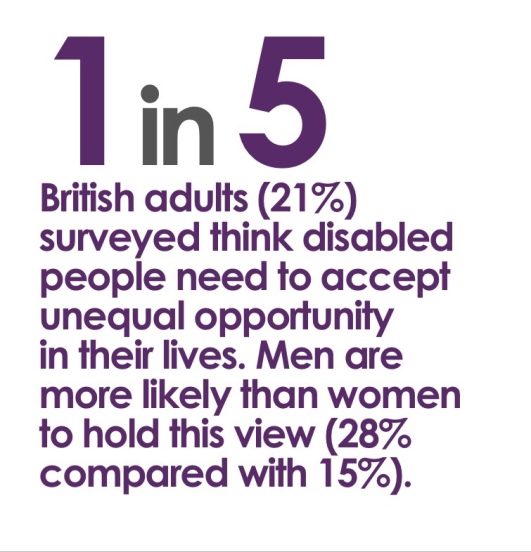Apparently, there is no greater disability in life than a bad attitude.
I have been reading that line on social media for far too long.
And it annoys me!
Because no matter how positive a person is, when faced by steps, inaccessible toilets, sand, mud or some other physical barrier, a good attitude simply doesn’t magically make things accessible!
Then I saw this statistic from the Papworth Trust.

Suddenly I see that, yes, a bad attitude is disabling people!
We have 650 MPs in the House of Commons. “One in five” could mean that 130 of them may well think that disabled people should stop complaining and just accept that they can’t access life fully.
There are approximately 800 members of the House of Lords. Which means that there could be 160 Lords who may not believe that disabled people should expect equality.
Data from 2012 shows that there are 23,472 schools in the UK. “One in five” suggests that 4874 schools could be managed by Heads who do not think disabled children are equal to non-disabled children. We might be seeing why so many disabled children end up excluded!
According to the government website there are 353 councils in England, which means that 70 councils (one in five) might be led by leaders who do not believe that disabled people are equal to non-disabled people. 70 councils in England alone could be having their social care decisions made by people who do not really believe in equality for disabled people! 70 councils in England alone may well have planning decisions swayed by people who just don’t care about disabled people.
In 2017 there were 3739 Tesco stores in the UK. Which suggest that 748 of them are managed by people who do not believe in equality for all. Out of those stores, only FOUR have Changing Places toilets, which suggests that maybe 3735 of them are actually managed by people who do not believe in equality. If that were so, it might mean that 99 in 100 Tesco managers believe that disabled people should stop complaining and accept that they mean less than able bodied people.
Suddenly, my heart aches even more.
“One in five” believing that my wonderful 11 year old son should accept less than his big brother does really hurts. And, with the response of some places to requests to make physical improvements to their properties, I can only feel that the reality is greater than one in five.




Nicely put – shocking statistics!
LikeLiked by 1 person
Thank you. It really struck me that these people are everywhere, in all walks of life. And some of the one in five are making decisions which affect those that they do not value.
LikeLike
I have this sense and notion that we influence and teach through our own example. So our children absorb the example of their parents through empathy and relational osmosis. Your attitude as parent and carer and advocate is exuded from what you write and how you write. How you parent and care and advocate and write, induces in your son the attitude he needs. The general others you speak of need to take on the attitude you promote. A multifaceted attitude of being attentive, kind, patient, intelligent, determined, articulate, present and future looking and concerned (and much more).
The situation of disability is not a structural one. Rather it’s one of human attitude and societal process. Just as you have expressed in what you have written today.
LikeLiked by 2 people
Yes exactly. The bad attitude is not coming from disabled people. It’s coming from the ableist society.
LikeLiked by 2 people
Reblogged this on yarn and pencil.
LikeLiked by 1 person
Thank you for sharing. It really does mean a lot.x
LikeLike
Reblogged this on The Inked Autist and commented:
This is disgusting. This kind of thought process is precisely what shut me out of my dream career. We as a society have to do better than this.
LikeLike
I hope we can do better. But it is hard to get through when decisions are made by the “one in five”.
Even among disability groups, I have experienced people who think I should not be expecting equal access to toilet facilities for my son. The “one in five” are everywhere.
LikeLike